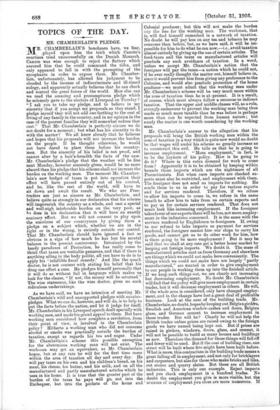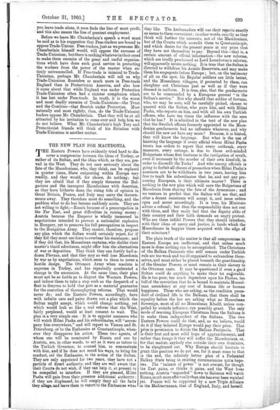TOPICS OF THE DAY.
MR. CHAMBERLAIN'S PLEDGE.
MR. CHAMBERLAIN'S henchmen have, we fear, )played upon him the trick which Canute's courtiers tried unsuccessfully on the Danish Monarch. Canute was wise enough to reject the flattery which assured him that he could command the tides, and only appeared to fall in with the prompting of the sycophants in order to expose them. Mr. Chamber- lain, unfortunately, has allowed his judgment to be clouded by the incense of indiscriminate and ill-timed eulogy, and apparently actually believes that he can check and control the great forces of the world. How else can we read the amazing and presumptuous pledge which he solemnly gave to the electors of Liverpool on Tuesday ? " I ask you to take my pledge, and to believe in my sincerity that if you accept my proposals as they stand, I pledge myself they will not add one farthing to the cost of living of any family in the country, and in my opinion in the case of the poorest families they will somewhat reduce that cost." That Mr. Chamberlain is perfectly sincere we do not doubt for a moment ; but what has his sincerity to do with the matter? We all knew already that he believes • and hopes that his proposals will not increase the burden on the people. If he thought otherwise, he would not have dared to place them before his country- men. But the sincerity of his belief is not proof, and cannot alter by a hair's-breadth the facts of the case. Mr. Chamberlain's pledge that the weather will be fine next Monday, however sincerely given, would be no more absurd than his pledge that his scheme shall not increase the burden on the working man. The moment Mr. Chamber- lain's new budget of taxes is put into operation their effect will have passed entirely out of his control, and he, like the rest of the world, will have to sit down and await the result. We who are Free- traders are just as sincere as Mr. Chamberlain, and believe quite as strongly in our declaration that his scheme will impoverish the country as a whole, and cast a special and well-nigh intolerable burden on the very poor, as II; does in his declaration that it will have an exactly contrary effect. But we will not consent to play upon the emotions of our countrymen by giving them a pledge on a subject which, whether we are in the right or in the wrong, is entirely outside our control. That Mr. Chamberlain should have ignored a fact so obvious is a sign of how much he has lost his mental balance in the present controversy. Intoxicated by the heady paradoxes of Protection, he has really come to think that taxes are veritable panaceas, and that if there is anything ailing in' the body politic, all you have to do is to apply his infallible fiscal remedy.' And like the quack doctor, he is not content with stating his belief that his drug can effect a cure. He pledges himself personally that it will do so without fail in language which makes us look for the clause, "If not, the money will be returned." The wise statesman, like the wise doctor, gives no such ridiculous undertakings.
As we have said, we have no intention of meeting Mr. Chaniberlain's wild and unsupported pledges with counter- pledges. What we can do, however, and will do, is to help to put the facts before the nation, and let it judge for itself. Mr. Chamberlain in his Liverpool speech dealt specially with working men, and made his grand appeal to them. But have working men considered how complete a revolution, from their point of view, is involved in the Chamberlain policy ? Hitherto a working man who did not consume alcohol or smoke was practically outside the burden of taxation, except as regards his tea and sugar. Under Mr. Chamberlain's scheme this possible exemption for the abstemious working man will not exist. The workman may get an equivalent, as Mr. Chamberlain hopes, but at any rate he will for the first time come within the area of taxation all day and every day. He will pay taxes on his own and his children's bread, on his meat, his cheese, his butter, and his milk, and on all the manufactured and partly manufactured articles which he uses in his home. It is true that the greater part of the burden of the taxes he pays will go, not into the Exchequer, but into the pockets of the home and Colonial producer; but this will not make the burden any the less for the working man. The workman, that is, will find himself enmeshed in a network of taxation. No doubt he will pay less on any tea and tobacco he may consume than before, but, as we have said, it will be im- possible for him to do what he can now,—i.e., avoid taxation almost entirely by giving up the use of certain articles. The food-taxes and the taxes on manufactured articles will preclude any such avoidance of taxation. In a word, unless we accept Mr. Chamberlain's notion that the foreigner will pay the taxes—a notion which he could not, if he ever really thought the matter out, himself believe in, since it would prevent him from giving any preference to the Colonies, and would also preclude protection of the home producer—we must admit that the working man under Mr. Chamberlain's scheme will be very much more within the zone of taxation than he is at .present. It is a result, of course, which must always follow a recourse-to indirect taxation. That the upper and middle classes will, as a rule, strongly endeavour to prevent the working man being thus made so much more taxable than he was before is perhaps more than can be expected from human nature ; but surely the matter is one worth considering by the working man.
Mr. Chamberlain's answer to the allegation that his proposals will bring the British working men within the zone of taxation in a way which is quite new would no doubt be that wages will under his scheme so greatly increase as to counteract this evil. He tells us that he is going to increase employment. "More employment," in fact, is to be the keynote of his policy. How is he going to do it ? Where -is this extra demand for work to come from ? Apparently it is to be obtained by keeping within bounds those imports which are the nightmare of all Protectionists. But when once imports are checked ex- ports must also be restricted, and employment with them. The foreigner does not send us imports for nothing. He sends them to us in order to pay for various exports and for services rendered. Therefore, if we refuse to allow his imports to come in, we refuse in the same breath to allow him to take from us certain exports and to pay us for certain services rendered. That does not much look like increasing employment. If the foreigner takes fewer of our exports there will be less, not more, employ- ment in the industries concerned. It is the same with' the services rendered by Englishmen to foreigners. If, owing to our refusal to take imports as payment for services rendered, the foreigner cannot hire our ships to carry his goods, and cannot get us to do other work for him, how is there going to be more employment ? But it may be said that we shall at any rate get a better home market by keeping out foreign imports. We doubt it. The mass of manufactured articles sent us from Germany and elsewhere are things which we could not make here conveniently. The things which we could not make here are largely " partly manufactured," are wanted in order to give employment to our people in working them up into the finished article. -If we keep such things out, we are clearly not increasing but decreasing employment. No doubt Mr. Chamberlain will find that his policy will give more employment in certain trades, but it will decrease employment in others. He will, if the whole area is considered, only have changed employ- ment, and in the change have lost a great deal of prOfitable business. Look at the case of the building trade. Mr. Chamberlain, no doubt, hopes by keeping out Belgian girdars, Swedish and American window-sashes and doors, Belgian glass, and German cement to increase employment in those trades. But will he ? Clearly he will not help the British trades unless prices are raised owing to the foreign goods we have named being kept out. But if prices are raised in girders, windows, doors, glass, and cement, it will not be possible to build as many houses and buildings as now. Therefore the demand for those things will falloff and fewer will be used. But if the cost of building rises, one street will be built where five might have been built before. What is more, this contraction in the building trade means a great falling off in employment, and not only for bricklayers and carpenters, but also for those who make bricks and tiles, cut stones and quarry slates. But these- are all British industries. This is only one example. Reject imports and you check employment in, a hundred trades. No doubt the employment you give is more visible, but the avenues of employment you close are more numerous. If you leave trade alone, it soon finds the line of most profit, and this also means the line of greatest employment.
Before we leave Mr. Chamberlain's speech a word must be said as to his suggestion that Free-traders are bound to oppose Trade-Unions. Free-traders, just as we presume Mr. Chamberlain himself would, will oppose the excesses of Trade-Unionism; but there is nothing whateverintheir creed to make them enemies of the great and useful organisa- 'tions which have done such good service in protecting the workers from the power of the master when en- tirely untrammelled. If Free-trade is inimical to Trade- Unionism, perhaps Mr. Chamberlain will tell us why Trade-Unionism flourishes so much more in Free-trade England than in Protectionist America, and also how it came about that while England was under Protection • Trade-Unionism often had a sinister complexion which it has lost under Free-trade. In truth, it is the worst and most deadly enemies of Trade-Unionism—the Trust and the Combine—that flourish under Protection. Most naturally and most rightly, then, do the Trade-Unionist leaders oppose Mr. Chamberlain. That they will be at all attracted by his invitation to come over and help him we do not believe. What Mr. Chamberlain's high Tory and Protectionist friends will think of his flirtation with Trade-Unionism is another matter.



















































 Previous page
Previous page